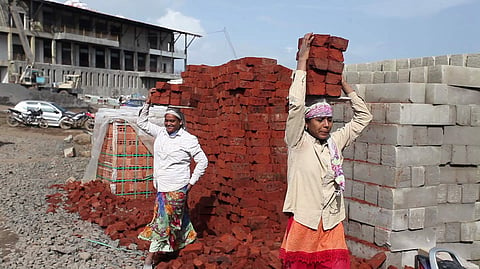

Like many who migrate to bigger cities in search of life and livelihood, Mithunchandra Chaudhari and many of his mates, hailing from a small village called Patkul in Maharashtra, came to Pune. Chaudhari went on to pursue his Diploma in Journalism from Savitribai Phule Pune University, became an Assistant Professor with Symbiosis Institute of Media and Communication and won the National Award in the category of Best Educational/Motivational/Instr
A few others who had made the journey with him made it big, some just simply pulled along, while the rest did not even get a chance to pursue their education and became gardeners, police constables and construction labourers. The 39-year-old even wrote a poem on this once. And now, this poem has given way to a non-fiction documentary called Anonymous. Released last year at the Visions du Réel Film Festival in Switzerland, this year, it reached SiGNS, another film festival, and continues to make itself heard — especially in the light of migrant labourers fleeing the big cities for the second time in recent history, thanks to the lockdowns.
It was in 2018 when Chaudhari came across a particular set of construction workers who, in his own words, were "being transported in trucks and tractors like non-living things." He felt compelled to learn their story, even share their plight. Thus began the 18-month-long journey of documenting migrants who construct our beautiful houses while temporarily living in tin shanties themselves. The short film doesn't shy away from referring to caste or class. It recognises the fact that it is distressed farmers, especially Dalits and Muslims, who are pushed into this kind of unorganised labour. "It makes one wonder, we call upper caste brahmins to do house-warming poojas yet those who have constructed the house with their bare hands have no place in the ceremony," says the professor poignantly.
Shot in interview style, Chaudhari, who remains off-camera, poses several intimate questions in Marathi and Hindi to these migrant labourers, which they answer candidly. Like Hari Kumar from Bihar had a tumultuous childhood and he talks about how hot the steel rods get during peak summers and yet, he has to carry them. He interviewed another man, an unnamed Muslim who dreamt of finishing his graduation and going to Kuwait for his higher studies, instead, he was toiling away doing hard, physical labour in Marathwada. Another worker, an Ambedkarite, sold his house for his daughter's education and he has nothing but calm acceptance to show for it. "I was shocked, but definitely not surprised with what they had to say. We live in a world where we are systematically taught to ignore them," says the director.
On an aside, when Chaudhari's brother constructed a house in 2012, the professor told him, point-blankly, that he would attend the house-warming ceremony only if the labourers were also invited. But as is the nature of labourers, they had left soon after the construction was done. But they managed to invite the carpenters and those who made the furniture and even gifted them new clothes
While there are single and tight shots that hover over the subjects for long, there are also montage shots where labourers are seen answering questions. One such question that hangs in the air for a long time is, 'Who constructed the Taj Mahal?' You'll have to watch the short film to know what they think the answer is.
Some statistics that will shake you:
- The construction industry in India employs over 75 million labourers
- Around four lakh construction labourers work in Pune
- Pune builds the highest number of residential apartments in Asia
- Labourers from Bihar, Uttar Pradesh, Odisha and so on are enlisted
- Muslims and dalits account for 70% of the construction labourers
(Source: Anonymous)
